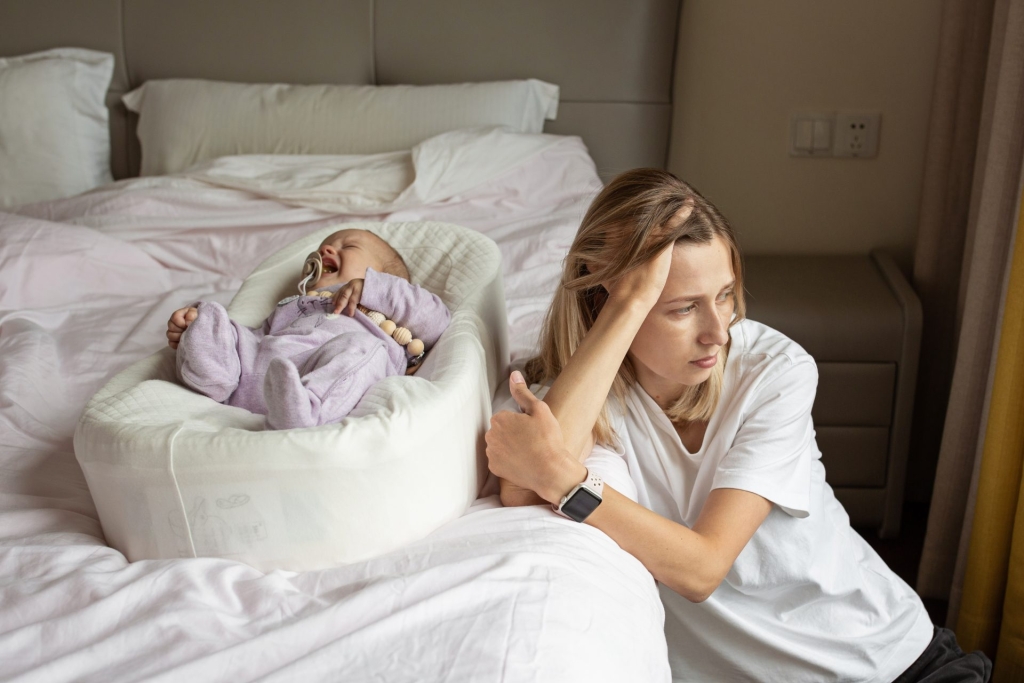Postpartum Depression (PPD) is a common experience for women following childbirth, typically occurring within six weeks after delivery, with statistics indicating one in seven women may develop PPD. It is common to experience what is known as “baby blues” after giving birth, characterized by mood fluctuations from happiness and joy to sadness and bouts of crying. Over the first two weeks after delivery, the baby blues tend to decrease. More concerning, there is Post-Partum Psychosis: hallucinations or delusions that may cause suicidal or homicidal thoughts.
Simply put, women undergo hormonal, physical, emotional, and psychological changes after childbirth, which can be challenging, exhausting, and even traumatic for some. Let’s explore the risk factors, symptoms, stigmas, and treatment/resources for PPD.
Risk Factors
- Psychological: history of sexual abuse, history of depression and anxiety, premenstrual syndrome, and a negative attitude towards baby’s gender.
- Obstetrics: high-risk pregnancy, emergency cesarean-section (c-section), hospitalization(s) during pregnancy, meconium passage (baby’s first poop while still in the womb), umbilical cord prolapse (when the umbilical cord exits the cervix before the baby), premature, low birth weight, and low hemoglobin.
- Social: lack of social support, domestic violence (physical, emotional/verbal, and sexual), and smoking during pregnancy.
- Lifestyle: eating habits, lack of sleep, and lack of physical exercise.
PPD Symptoms
- Depressed mood
- Loss of interest or pleasure in things
- Insomnia or hypersomnia
- Moving or speaking slower than usual
- Agitation/irritability
- Worthlessness or guilt
- Fatigue and loss of energy
- Suicidal ideation or attempt and thoughts of death
- Trouble concentrating
- Indecisiveness
- Changes in weight or appetite
- Psychotic features: hearing or seeing things that others do not
Postpartum Psychosis
Postpartum Psychosis (PPP) happens after giving birth, like PPD, however this condition affects your sense of reality. There are three types of PPP: The depressive type is the most common and most dangerous, the manic is the next most common type, and lastly the mixed/atypical is the least common.
Depressive PPP Symptoms
- Feeling anxious or panic
- Delusions or hallucinations
- Feeling guilty
- Loss of appetite
- Less interest or pleasure in things
- Thoughts of harming self or baby
Manic PPP Symptoms
- Irritable/agitation
- Talking more than usual and/or faster
- Behaving more aggressively or disruptive
- No need for sleep (not sleeping)
- Delusions of greatness (believing your child is a religious figure)
Mixed/Atypical PPP Symptoms
- Speaking or acting in a disorganized way
- Seeming disoriented or confused
- Hallucinations or delusions
- Saying or doing inappropriate things
- Not speaking at all (catatonia)
The Stigma
Statistics show that about 50% of new mothers with PPD go undiagnosed due to issues with privacy and not wanting to disclose these issues with family members. As a mother, there are a lot of responsibilities put on us, including expectations of what a “good mother” is or should be. It’s difficult for mothers to express themselves and ask for help, in fear of being judged, invalidated, and even fear of losing their children.
Having a lack of support can also play a big factor. If a mother lacks social support and is fearful to turn to her doctor, she may feel isolated and overwhelmed. These feelings are entirely normal, and it’s crucial to recognize that every mother experiences them at some point. Remember, you are not alone, and it’s perfectly acceptable to ask for help. One of the most valuable pieces of advice for new mothers is to prioritize self-care and take breaks when needed. It’s okay to step away for a few moments to collect yourself, even if your baby is crying. Taking care of your well-being is important for both you and your baby’s health and happiness.
Treatment and Resources for PPD
- Engage in counseling/therapy services and/or psychiatric medications. Schedule an appointment with a NOAH mental health provider. In-person and Telehealth appointments are available.
- Join mom’s groups on social media/in real life.
- Enroll in a home visitation program meant for new moms and their babies.
- Take the Edinburgh Postnatal Depression Scale questionnaire to help identify if you may suffer from PPD.
If you feel like hurting yourself or your baby, please put your baby in a safe space, go to a different space, and dial 988 or 911 immediately.



